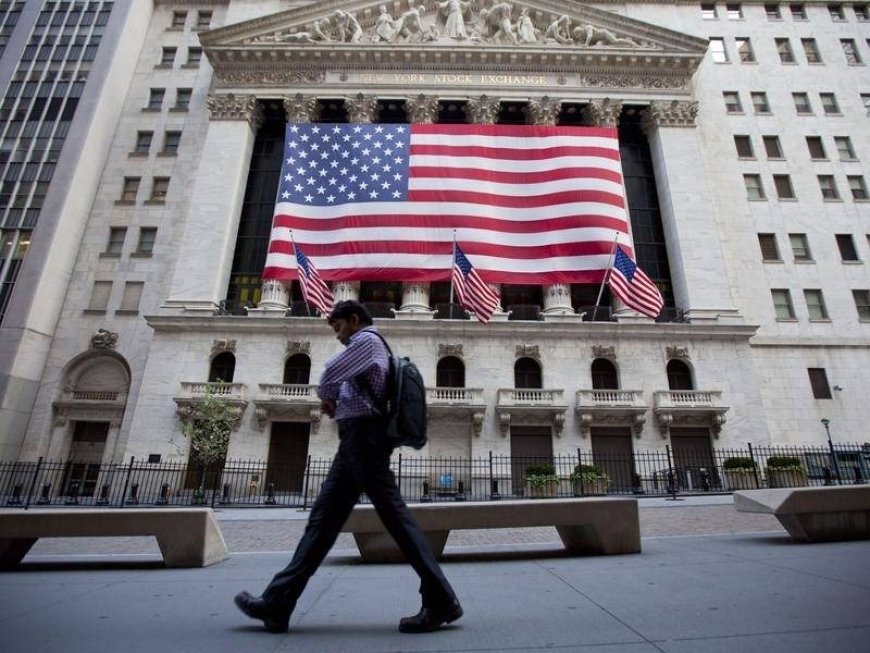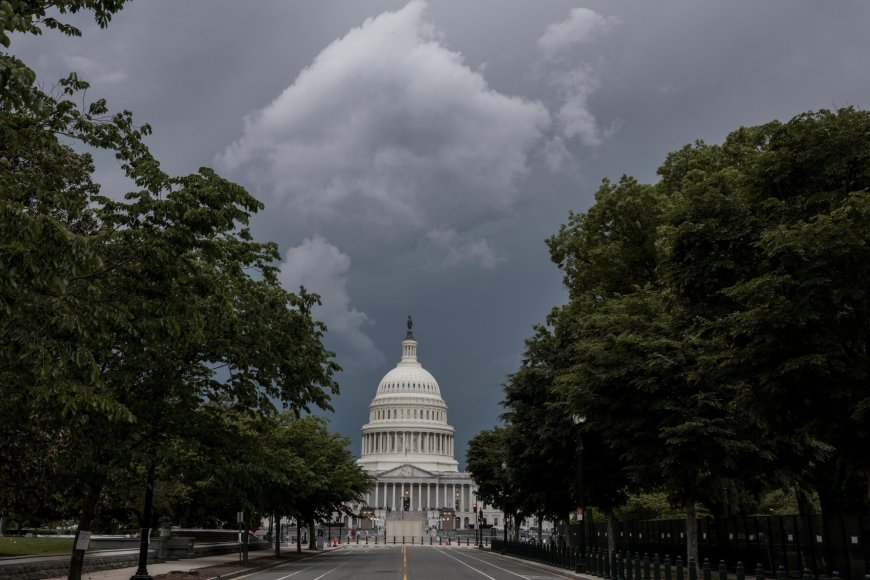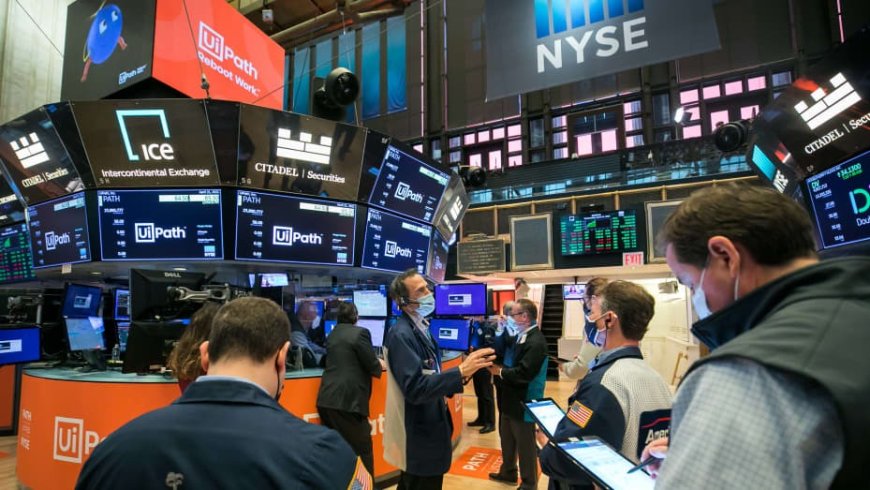Fitch Downgrades US Credit Rating, Sparking Global Stocks and Treasury Yields Decline: Live Market Updates
Get live updates on US stock market futures after Fitch's US debt downgrade. Stay informed on market sentiment and its impact on sectors and industries. Follow real-time developments now.

Global stocks and US futures experienced a downward shift on Wednesday after Fitch, the rating agency, downgraded the credit rating of the US government. The downgrade was prompted by concerns over fiscal and political instability, leading to heightened investor caution.
Before the opening bell, the S&P 500 index showed a decline of 0.5%, while the Dow Jones Industrial Average fell approximately 0.3%. The tech-heavy Nasdaq Composite slipped by 0.7%, reflecting the broader market sentiment.
The downgrade received an immediate response from the Biden administration, with the Treasury Department expressing dissatisfaction, labeling the decision as "arbitrary." This response comes in light of the recent successful efforts by the White House and Congress to avert a debt default a couple of months ago.
Despite the rating downgrade being top of mind, investors are also closely monitoring another full day of earnings reports. Key companies, including CVS, Kraft Heinz, PayPal, Shopify, Occidental Petroleum, Etsy, and Robinhood, are among those scheduled to report before and after the bell.
The market's reaction to the downgrade and the earnings reports are of paramount importance, and market watchers are keeping a close eye on the developments as the day progresses. Stay tuned for live updates and expert analysis on the implications of these events on various sectors and industries.
Key Moments
- Fitch downgrades US credit rating, stocks fall.
- S&P 500, Dow Jones, Nasdaq decline.
- Biden administration calls downgrade "arbitrary."
- Busy day of earnings reports ahead.
-
e.l.f. Beauty, CVS, Kraft Heinz, and Humana: Key Stocks Making Waves Before the Bell
On Wednesday, several stocks caught the attention of investors on Yahoo Finance's trending tickers page during premarket trading:
- e.l.f. Beauty, Inc. (ELF): The beauty group's shares surged by 18% following its announcement of quarterly earnings at $1.10 per share, surpassing the Zacks Consensus Estimate of $0.58 per share.
- CVS Health Corporation (CVS): The healthcare company witnessed a 2% increase in its share price after reporting better-than-expected second-quarter earnings and launching a restructuring program aimed at cost reduction.
- Kraft Heinz Company (KHC): The food and beverage giant experienced a 1% decline in its share prices after reporting missing quarterly sales estimates due to inflationary pressures impacting consumers.
- Humana Inc. (HUM): The health insurance company's shares rose by 3% following the release of positive second-quarter profit results.
These trending stocks highlight the dynamic nature of the market, making them crucial for investors to closely monitor as trading continues.
-
Why the Downgrade Matters: A Risk to Global Trust in the US
The stability of the global financial system depends on the confidence that the US government will always honor its debts, which has made the US dollar the world's preferred currency. However, the recent credit rating downgrade by Fitch poses a potential threat to this trust.
Although the timing of the downgrade came as a surprise to some, Fitch had already expressed concerns earlier. In May, during a heated debate in Congress over raising the debt ceiling to avoid a government default, Fitch had put the US credit rating on watch. The issue was eventually resolved in June, but Fitch proceeded to downgrade the US credit rating.
Fitch's decision was driven by their expectation that the country's financial situation could deteriorate over the next three years. They specifically highlighted the alarming trend of the government's mounting debt, which has now exceeded a staggering $32 trillion - equivalent to almost $100,000 for every single American citizen.
-
The Implications of a Downgrade: Affect on Treasury Yields and the US Economy
The recent credit rating downgrade carries significant consequences, particularly in regard to Treasury yields and the US economy. With the downgrade, there is a possibility of higher Treasury yields, which could result in increased financing costs for the US government's substantial debt. Fitch's projection of a rise in America's general government deficit to 6.3% of GDP in 2023 (compared to 3.7% in 2022) adds further concern to the situation.

US economy The impact may extend to consumers, as higher yields could lead to costlier mortgage and loan payments, potentially dampening consumer spending and affecting the overall health of the US economy.
Despite the downgrade, US Treasury yields remained stable on Wednesday morning, and analysts at Goldman Sachs do not foresee any significant forced selling of Treasury securities due to the rating change. Past experiences with downgrades have shown limited impact on such forced selling.
China and Japan, two major foreign investors in American government debt, hold a combined $2 trillion, representing over a quarter of the $7.6 trillion in US Treasury securities owned by foreign countries. However, there is currently no indication that they are considering selling off their holdings.
Market reactions to the downgrade have been relatively muted, likely influenced by the expectation of potential repercussions from America's divided government and frequent debt-ceiling standoffs. Analysts suggest that the market has already factored in and assessed the consequences of such political challenges.
In summary, the downgrade's far-reaching implications on Treasury yields, consumer spending, and the overall economy necessitate close monitoring as the situation unfolds.
-
The Most Recent Credit Rating Downgrade in the US: A Recap
The last time a major credit rating agency downgraded the US debt was back in 2011. This happened after lengthy negotiations to raise the debt limit.
What Followed the Downgrade?
Following the announcement of the downgrade on a Friday afternoon, investors had the entire weekend to contemplate their next moves. However, the market witnessed a substantial 6.5% drop in the S&P 500 on the first trading day after the downgrade. This led to one of the most volatile weeks since the 2008 global financial crisis. It took nearly six months for the stock market to recover and reach its previous levels.
What Was the Previous US Credit Rating?
Before the 2011 downgrade, the US debt held a flawless AAA credit rating since 1917, assigned by Moody's Investors Service. However, the recent Fitch rating now places the US on a similar level as Austria and Finland, but below Switzerland and Germany.
Current Credit Ratings of the US
Since the 2011 downgrade, S&P has maintained its AA+ rating on the US, while Moody's has continued to keep its AAA rating intact.
-
Bank of America Changes Forecast on US Recession
The US economy's surprising strength has led Bank of America to change its prediction of a mild recession. Instead, the bank now joins others in expecting a softer landing for the economy.
In a note to clients, Bank of America economists explained that they now believe the economy will continue to grow positively in the next few quarters, and the unemployment rate will rise at a slower pace.
The bank's decision is based on the ongoing growth of US GDP, the near-record low unemployment rate, and the cooling of inflation and wage growth.
Bank of America has upgraded its forecast for 2023 GDP growth to 2% from the previous estimate of 1.5%. Additionally, they now expect a 0.7% GDP growth next year, compared to their earlier prediction of no growth.
This is a significant change from their previous warning of job losses and a potential mild recession. The resilient consumer spending, hiring, and cooling inflation have influenced economists to delay or even discard recession predictions.
Although Bank of America now predicts the unemployment rate to peak at 4.3% in early 2025, they still caution that a downturn is possible, assigning a 35%-40% chance of a mild recession. While the outlook has improved, they acknowledge that the economy is not entirely free from risks.
-
US Stocks Experience Lower Opening Following Credit Downgrade

Stock Market As trading commenced on Wednesday, US markets experienced a decline after Fitch downgraded the long-term US credit, causing the Dow to drop 155 points (0.4%), the S&P 500 to slide 0.8%, and the Nasdaq Composite to fall by 1.1%.
While the credit downgrade made headlines, Treasury yields remained relatively stable, and the impact on the US dollar was minimal.
Fitch attributed the downgrade to the recent debt ceiling standoff, but market experts are uncertain about its potential long-term effects. Traders are closely monitoring the ongoing second-quarter earnings reports.
Match Group, the parent company of Tinder and Hinge, caught investors' attention as its shares surged approximately 5.2% following better-than-expected earnings and positive forward guidance. Conversely, SolarEdge Technologies experienced a sharp decline of over 16% after missing revenue expectations.
CVS also saw a slight drop of about 1% in its shares, despite surpassing earnings and revenue expectations. The company's recent announcement of a cost-cutting plan, including the layoff of 5,000 employees, may be contributing to the market response.
In economic news, private sector companies added more jobs than anticipated in July, with around 324,000 jobs added, surpassing analysts' projections of approximately 189,000 jobs. The strong jobs report may indicate a potential interest rate increase by the Federal Reserve at its next meeting in September.




































































